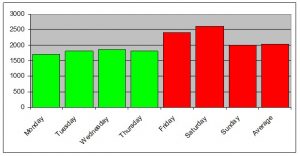If you’ve ever taken to Google for weight loss advice, you may have come across a rule called “80/20.” Put shortly, it explains that you eat a healthy, strict diet 80 percent of the time and you can let loose the other 20 percent. Essentially eating whatever you want even if it is “unhealthy.” This is a popular approach for many because it appeals to those who work hard during the week and use that as an excuse to binge on weekends. But here’s the issue: it doesn’t work like that.
Let’s talk to about an imaginary client named John Doe. John exercises at Peak and his goals is to lose one pound per week. He’s learned from his Exercise Physiologist that he needs to be expending 3500 calories more than he consumes. He takes a Resting Metabolic Rate test and finds out that to achieve his goal, he needs to eat 1800 calories a day to help him lose that pound. John Doe works really hard during the week to hit his goal; he comes into Peak every morning for his 7AM workout. But then Friday comes around and he decides to hit happy hour after work. John goes over his calorie budget for Friday. He has a family BBQ on Saturday and does the same thing. Sunday John Doe eats okay but misses his weekly workout. This form of eating is often referred to as “binging” and is an unhealthy habit. It’s only 2 days, but Saturday and Sunday account for 28% of your week. By not monitoring his calories on the weekends, John accidentally eats too much and doesn’t lose any weight this week.
Use this graph as an example of how John’s calories look each day:

The moral of the story here is moderation! One slip up will not put you into the red, but a series of slips ups or “cheat days” might! Finding that balance is the key to your weight loss success. You can go to happy hour once in a while and enjoy the graduation BBQ, but it is important to remember not to let that one event string into a series of bad days, thus slowing your progress.
By Matt Rhodes

